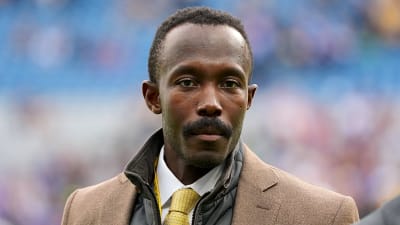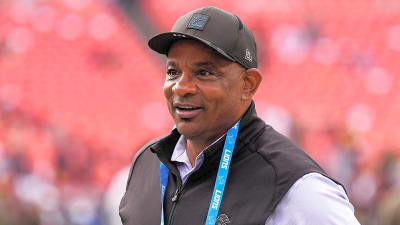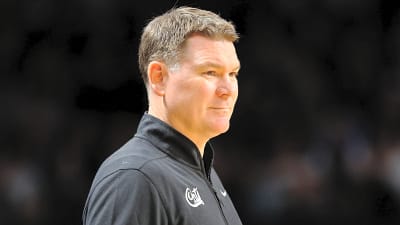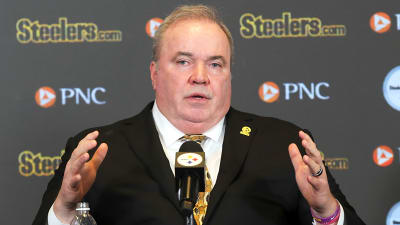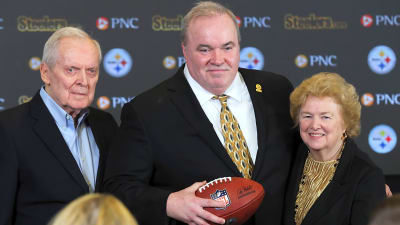- Home
- Quizzes
- My Quiz Activity
- Newsletters
- MY FAVORITES
- Add Sports/Teams
- SPORTS
-
NFL
- NFL Home
- Arizona Cardinals
- Atlanta Falcons
- Baltimore Ravens
- Buffalo Bills
- Carolina Panthers
- Chicago Bears
- Cincinnati Bengals
- Cleveland Browns
- Dallas Cowboys
- Denver Broncos
- Detroit Lions
- Green Bay Packers
- Houston Texans
- Indianapolis Colts
- Jacksonville Jaguars
- Kansas City Chiefs
- Las Vegas Raiders
- Los Angeles Chargers
- Los Angeles Rams
- Miami Dolphins
- Minnesota Vikings
- New England Patriots
- New Orleans Saints
- New York Jets
- New York Giants
- Philadelphia Eagles
- Pittsburgh Steelers
- San Francisco 49ers
- Seattle Seahawks
- Tampa Bay Buccaneers
- Tennessee Titans
- Washington Commanders
-
MLB
- MLB Home
- Athletics
- Arizona Diamondbacks
- Atlanta Braves
- Baltimore Orioles
- Boston Red Sox
- Chicago White Sox
- Chicago Cubs
- Cincinnati Reds
- Cleveland Guardians
- Colorado Rockies
- Detroit Tigers
- Houston Astros
- Kansas City Royals
- Los Angeles Angels
- Los Angeles Dodgers
- Miami Marlins
- Milwaukee Brewers
- Minnesota Twins
- New York Yankees
- New York Mets
- Philadelphia Phillies
- Pittsburgh Pirates
- San Diego Padres
- San Francisco Giants
- Seattle Mariners
- St. Louis Cardinals
- Tampa Bay Rays
- Texas Rangers
- Toronto Blue Jays
- Washington Nationals
-
NBA
- NBA Home
- Atlanta Hawks
- Boston Celtics
- Brooklyn Nets
- Charlotte Hornets
- Chicago Bulls
- Cleveland Cavaliers
- Dallas Mavericks
- Denver Nuggets
- Detroit Pistons
- Golden State Warriors
- Houston Rockets
- Indiana Pacers
- Los Angeles Clippers
- Los Angeles Lakers
- Memphis Grizzlies
- Miami Heat
- Milwaukee Bucks
- Minnesota Timberwolves
- New Orleans Pelicans
- New York Knicks
- Oklahoma City Thunder
- Orlando Magic
- Philadelphia 76ers
- Phoenix Suns
- Portland Trail Blazers
- Sacramento Kings
- San Antonio Spurs
- Toronto Raptors
- Utah Jazz
- Washington Wizards
-
NHL
- NHL Home
- Anaheim Ducks
- Boston Bruins
- Buffalo Sabres
- Calgary Flames
- Carolina Hurricanes
- Chicago Blackhawks
- Colorado Avalanche
- Columbus Blue Jackets
- Dallas Stars
- Detroit Red Wings
- Edmonton Oilers
- Florida Panthers
- Los Angeles Kings
- Minnesota Wild
- Montreal Canadiens
- Nashville Predators
- New Jersey Devils
- New York Islanders
- New York Rangers
- Ottawa Senators
- Philadelphia Flyers
- Pittsburgh Penguins
- San Jose Sharks
- Seattle Kraken
- St. Louis Blues
- Tampa Bay Lightning
- Toronto Maple Leafs
- Utah Mammoth
- Vancouver Canucks
- Vegas Golden Knights
- Washington Capitals
- Winnipeg Jets
- NCAAF
- NCAAM
- Olympics
- Boxing
- Entertainment
- Lifestyle
- Golf
- MMA
- Soccer
- Tennis
- Wrestling
- Sports Betting
- More Sports
- RESOURCES
- My Account
- YB on Facebook
- YB on Twitter
- YB on Flipboard
- Contact Us
- Privacy Policy
- Terms of Service

Top 50 college running backs of all time
A lot has changed in college football in the near 150 years the sport has been played. Gone are the days of everyone playing offense and defense. The forward pass (though it took some time) became a major part of the game, and there are more receivers and less four-man backfields.
Still, the core of what a running back — or halfback — does hasn't changed greatly. The ball is handed off to you, and you try to run as far as you can before you get tackled.
Sure, backs are relied on more as receivers, and with the explosion of spread offenses the ability for running backs to have open fields has changed what defines the position. RPOs have largely replaced the triple option, and the advancement of equipment and medical care has helped prolong a back's effectiveness. Point being: Great backs can transcend different eras, even with the changes.
Putting together a list of the top 50 college running backs of all time is still tough. Some players stacked up great numbers as four-year starters, while others got a chance to display their greatness for only a couple of seasons. All were great. So enjoy this rundown of the top backs in college football history.
Marcus Allen, USC
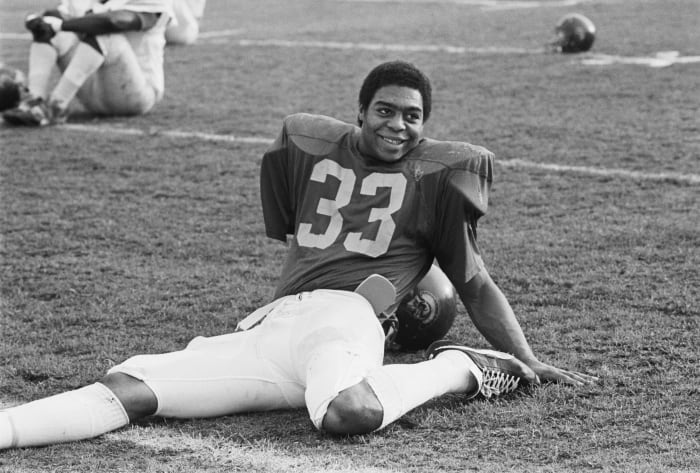
Allen backed up Heisman winner Charles White before getting his turn to shine. In his junior and senior seasons, Allen ran for 3,905 yards and 36 touchdowns (and won his own Heisman award in his senior season). He is the only player to have won an NCAA championship, Super Bowl championship, Heisman trophy, NFL MVP and Super Bowl MVP.
Montee Ball, Wisconsin

Ball continued the tradition of star running backs at Wisconsin. When he left Madison, his 77 rushing touchdowns was the FBS record (since broken by Navy's Keenan Reynolds). Ball didn't even start until the final month of his sophomore season yet still ran for 18 touchdowns that year. He ended his career with 5,140 yards rushing and 598 yards receiving.
Saquon Barkley, Penn State

A powerful running back and capable receiver, Barkley was a terror at Penn State. In three seasons, Barkley ran for 3,843 yards, caught 102 passes for 1,195 yards and returned kicks for 519 yards with a total of 53 touchdowns. He even threw a touchdown pass his junior season. He was Big Ten Offensive Player of the Year twice and even once won the conference's return specialist award.
Cedric Benson, Texas
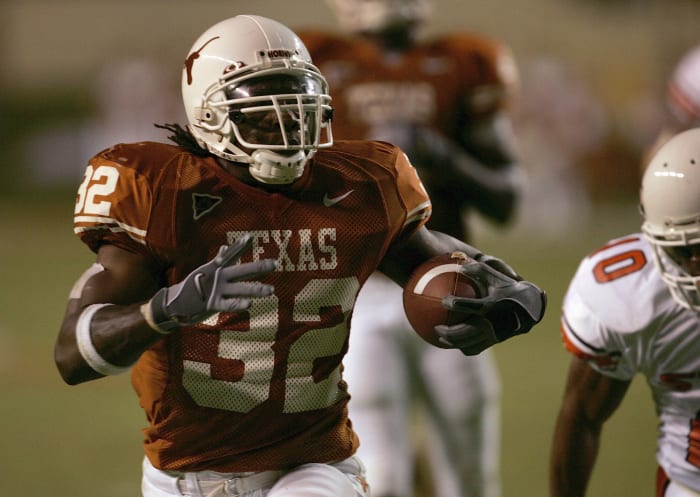
It's not often a running back rushes for 1,000 yards in all four of his college seasons, but Benson is one of those backs. Each season, he added to his rushing total and would rake in 5,540 yards and 64 touchdowns for his career. He won the 2004 Doak Walker Award, was a consensus All-American and was All-Big 12 four straight years.
Doc Blanchard, Army

Blanchard originally attended North Carolina before joining the Army in 1943. He got into West Point the following season, and the rest is history. Blanchard's stats don't do him justice, as he shared the backfield with Glenn Davis, who won the Heisman Trophy in 1946 — the year after Blanchard won it. He ran for 1,670 yards and totaled 35 touchdowns and the Black Knights went 27-0-1 during his time there. (The tie was the legendary 0-0 battle with Notre Dame.)
Jim Brown, Syracuse

Brown, who also played basketball, lacrosse and track at Syracuse, was a two-time All-American who is regarded as one of the best athletes of all time. He played in only 24 games at Syracuse (the season was only eight games long then), so his statistics don't do him justice. He ran for 2,091 yards and 19 TDs and was the Orangemen's placekicker.
Reggie Bush, USC

Sure, Bush's career at USC has officially been wiped off the books, but those memories remain. The all-around back ran for 3,169 yards, gained 1,301 yards receiving and had over 2,000 kick and punt return yards for USC, which culminated in the 2005 Heisman Trophy Award. Bush was explosive and one of the most dangerous weapons in the country. His Heisman and the Trojans' national title were later vacated over improper benefits.
Earl Campbell, Texas

Campbell was one of the most punishing running backs in football history. At Texas, he ran for 4,443 yards and 40 touchdowns and won the 1977 Heisman Trophy. In that Heisman season, Campbell led the nation in rushing and led the Longhorns to an undefeated regular season. (They would lose in the Cotton Bowl.)
John Cappelletti, Penn State
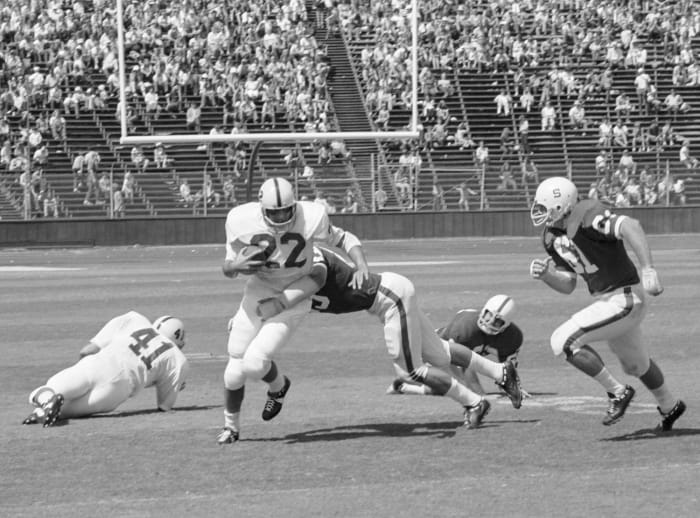
Cappelletti played only two years at running back for the Nittany Lions. Freshmen were ineligible at the time and with Franco Harris already there, he played defensive back as a sophomore. In those two seasons as a back, Cappelletti rushed for 2,639 yards and 29 touchdowns...winning the 1973 Heisman Trophy Award and a national championship.
Ka'Deem Carey, Arizona
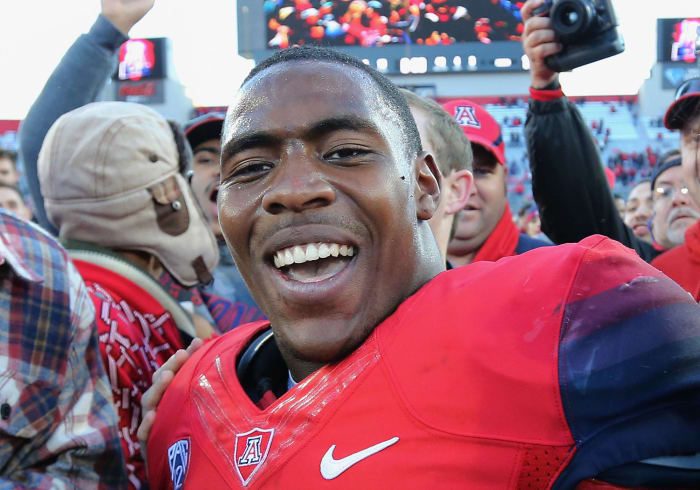
After getting his feet wet as a freshman, Carey exploded as a sophomore. He ran for 1,929 yards and 23 touchdowns — both school records. In that same season, he set the Pac-12 single-game rushing record with 366 yards against Colorado. For his three-year career in Tucson, he ran for 4,239 yards and totaled 52 touchdowns and a consensus All-American twice.
Troy Davis, Iowa State

Troy Davis exploded on the scene as a sophomore with 2,010 yards rushing and 15 TDs. At that time, he became just the second player to ever rush for 2,000 yards twice and not win the Heisman Trophy. (He ran for 2,185 yards the following season,) He did all this on some very bad Cyclones teams — Iowa State was 5-17 in the two seasons Davis topped 2,000 yards rushing.
Ron Dayne, Wisconsin

Ron Dayne is the all-time leading rusher (if you count bowl games), and it isn't very close. Dayne ran for 7,125 yards (599 more yards than second place Tony Dorsett) and 71 touchdowns at Wisconsin. He won the 1999 Heisman Trophy (along with virtually every other award), and he's one of only four players to win consecutive Rose Bowl MVPs.
Eric Dickerson, SMU
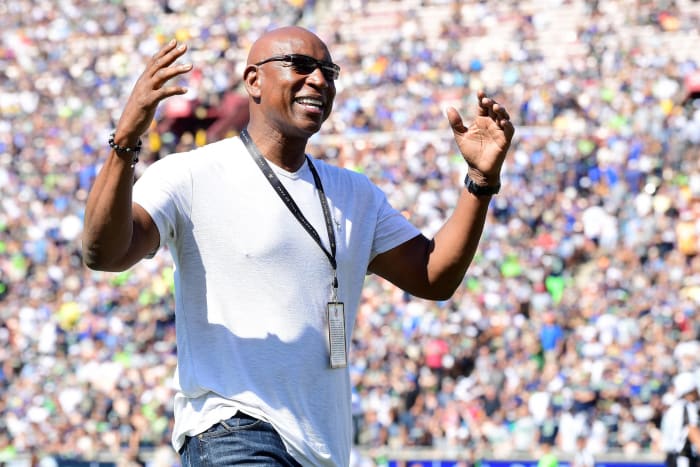
Yes, there was a ton of controversy surrounding Dickerson and the SMU program in the early 1980s, but you cannot deny his talent. At SMU, Dickerson ran for 4,450 yards and 47 touchdowns and owns the Southwest Conference's all-time rushing yards record. He did all of that despite sharing the backfield with Craig James.
Tony Dorsett, Pittsburgh

In 1973, Dorsett became the first freshman to be named to the All-American team since World War II. In 1976, he won the Heisman Trophy as he led the Panthers to a national championship. Along the way he set the career rushing mark (6,526), which was broken by Ron Dayne in 1999, and the rushing touchdown mark. (His 59 scores rank 11th now.)
Ezekiel Elliott, Ohio State

Elliott started his career as Carlos Hyde's backup but soon made a name for himself. In his sophomore and junior years, he ran for 3,699 yards and 41 touchdowns. He also ran for 246 yards and four TDs in the inaugural College Football Playoff National Championship game. Despite being the lead back in just two seasons, he trails only Archie Griffin in career rushing yards at Ohio State.
Marshall Faulk, San Diego State

In his second college game, Faulk ran for 386 yards and seven TDs against Pacific, beginning one of the greatest freshman seasons ever with 1,429 yards and 23 TDs. He left the Aztecs after his junior season as a first team All-American all three years and with 5,562 all-purpose yards and 62 touchdowns. He was a finalist for the Heisman Trophy three times, finishing second in 1992.
Mike Garrett, USC
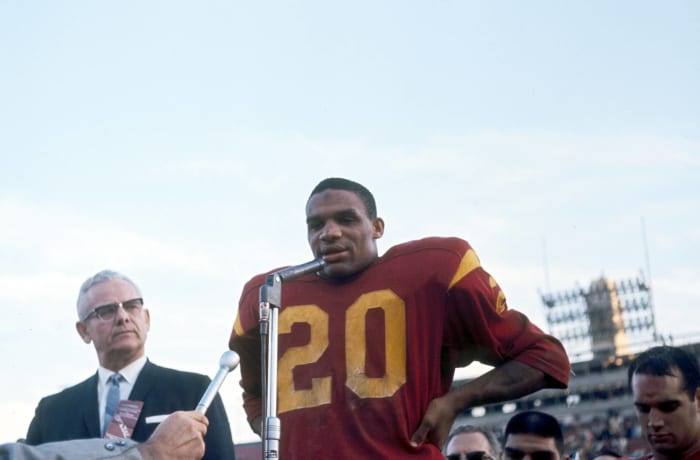
Garrett began the run of great Trojans running backs in the 1960s and 1970s. He set NCAA and Pac-8 records for rushing (3,221 yards, 25 TDs) and was one of the most flexible players at that time. He was a good pass catcher, a punt and kick returner and even threw two touchdowns. Garrett won the 1965 Heisman Trophy Award.
Eddie George, Ohio State

George's standout college career really boils down to his junior and senior seasons. After just 79 carries in his first two seasons in Columbus, George exploded for 3,369 yards and 36 touchdowns — and won the 1995 Heisman Trophy. In that senior season, George developed into a fine pass-catcher, reeling in 47 receptions and a touchdown.
Melvin Gordon, Wisconsin

Gordon's college claim to fame was setting the single-game rushing mark with 408 yards against Nebraska in 2014. That record would last for one week, as Oklahoma's Samaje Perine would break it. Still, Gordon ran for 4,915 yards and 45 TDs in three-plus seasons (he played in just three games before using a medical redshirt his freshman year) and won the Doak Walker Award his junior year.
Red Grange, Illinois
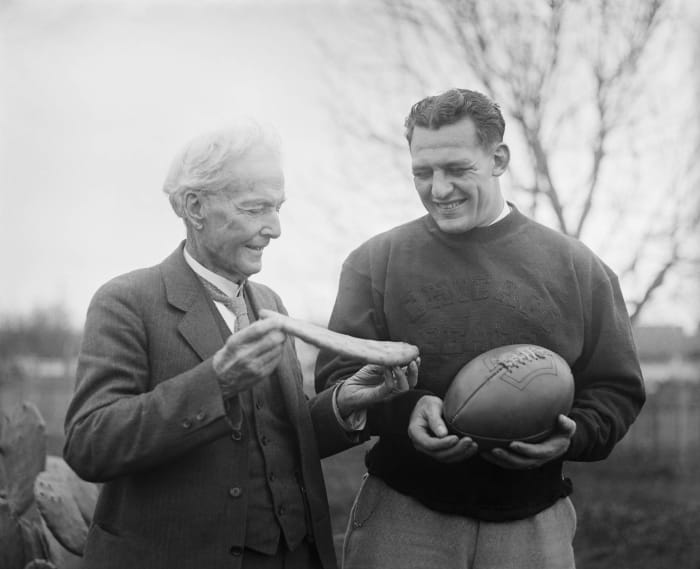
The Galloping Ghost was a three time All-American who brought the Illini the national championship in 1923. In what may be his most memorable moment, Grange scored four touchdowns in 12 minutes against Michigan (he returned the opening kickoff for a touchdown, then broke off three huge runs) en route to six total TDs in the game. He scored a touchdown in all but one game he played at Illinois.
Archie Griffin, Ohio State

Griffin is the only player to ever win the Heisman Trophy twice. As a team, Griffin's Buckeyes won four Big Ten titles (they would win only one of the Rose Bowls during that stretch, though) and finished 40-5. From his sophomore year on, Griffin ate up yards (he ran for at least 1,450 yards his last three years in Columbus) and ran for 100 yards in a record 31 consecutive games.
Derrick Henry, Alabama

At Alabama during the Nick Saban era, it is tough to be a running back if you want to pile up stats. Usually the backfield is filled with talent, and at 'Bama Henry shared time with Kenyan Drake, T.J. Yeldon and Damien Harris. Still, Henry managed 3,591 yards over three seasons with much of that coming in his Heisman season of 2015. There, he set the SEC's single-season rushing mark (2,219) and ran for 28 touchdowns while leading the Crimson Tide to another national championship.
Bo Jackson, Auburn

Jackson passed up a contract to play baseball for the Yankees to play football at Auburn. In his first college game, he ran for 123 yards and two touchdowns. Aside from a shoulder injury that hindered his junior season, Bo was unstoppable. He ran for 4,303 yards and 43 touchdowns for his Tigers career, winning the 1985 Heisman Trophy and beginning his legend.
LaMichael James, Oregon

James, in a word, was marvelous. He broke out as a freshman (1,546 yards, 14 TDs) to begin an outstanding three-year career with Oregon. He averaged over 137 yards per game and would finish with 5,082 yards and 57 total touchdowns as a Duck. He led Oregon to the 2011 BCS Championship game.
Ed Marinaro, Cornell

Marinaro just dominated the Ivy League in the early 1970s. In three years (when he played in just nine games each year) he totaled 4,715 yards rushing and 50 TDs. That is an average of nearly 175 rushing yards per game. He would finish second to Pat Sullivan in the 1971 Heisman voting. Marinaro would go on to have a decent acting career, appearing on television in "Hill Street Blues" and "Blue Mountain State."
Christian McCaffrey, Stanford

McCaffrey combined elite running ability with the skill of a pass-catcher who also liked to return kicks. In 2015, he broke Barry Sanders' record for all-purpose yards (2,019 yds rushing, 645 yards receiving, 1,070 kick return yards, 130 punt return yards). That year he even threw two touchdowns on three pass attempts. He owns several school records and is regarded as one of the best all-around backs in college history.
Darren McFadden, Arkansas

McFadden shredded up the SEC in his three seasons in Fayetteville. "Run DMC" ran for 4,590 yards and 41 touchdowns (he also caught two TDs) at Arkansas, setting Razorbacks records along the way. He also completed 14 passes during his Hogs career, seven of which went for touchdowns. He joins Ricky Williams as the only two to win the Doak Walker Award twice.
Steve Owens, Oklahoma

Owens was a touchdown machine. Over three seasons, he rushed for 3,928 yards and 57 touchdowns. When he graduated, he was the career leader in rushing yards and rushing touchdowns. (They both would be broken within two years.) He was a workhorse back who had only one run for over 40 yards during his college career. He even threw touchdowns on his first three passes in college. In 1969, he became the second Sooners player to win the Heisman Trophy.
Walter Payton, Jackson State

Due to the SEC not really recruiting him, Payton starred at Jackson State. There he set school records for career rushing yards (3,600) and touchdowns (65). In a game against Lane College during his sophomore season, he scored seven touchdowns and two two-point conversions in a 72-0 victory. He was named the Black College Player of the Year in 1973 and 1974.
Adrian Peterson, Oklahoma

Peterson's combination of explosiveness and power allowed him to burst on the scene as a freshman, rushing for 1,925 yards and 15 TDs for the Sooners. Injuries limited him during his sophomore and junior seasons, but he still ended up rushing for over 4,000 yards and 41 touchdowns.
Travis Prentice, Miami-OH
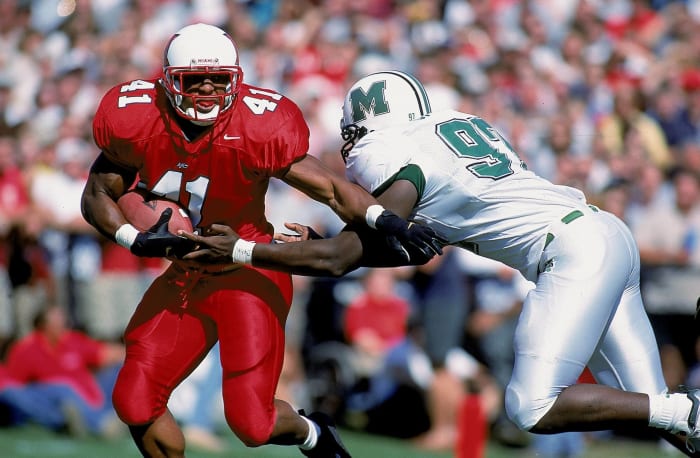
Prentice unfortunately had his great career at the same time Ricky Williams and Ron Dayne were carving up the record books. Still, when he graduated, he was third all time in career rushing (5,596 yds) and the all-time rushing touchdowns leader with 73 (since broken by Montee Ball and Keenan Reynolds). He also went an NCAA-record 862 carries without losing a fumble.
Donnel Pumphrey, San Diego State

Most people never saw Pumphrey play, but he finished his career with the third-most rushing yards in FBS history (when adding bowl games) and 67 total touchdowns. He didn't become the full-time starter until his sophomore year but still managed to run for 6,405 yards. He used his short stature (just 5-foot-9) to hide behind his blockers and his speed to explode into the open field.
Ray Rice, Rutgers

Rice was a beast for Rutgers and ushered in the one of the best runs in program history. Rice rushed for 4,926 yards and 49 touchdowns in just three seasons and is the second all-time rusher in Big East history. He led the Scarlet Knights to their first bowl game in 27 years and their second bowl game ever in 2005. The following year was the program's first bowl win.
George Rogers, South Carolina

Amazingly, Rogers' 5,091 rushing yards is still a Gamecocks record. After easing his way into the starting job as a freshman, Rogers turned it on the rest of his career. He rushed for over 1,000 yards despite playing just eight games in his sophomore season then ran for 1,681 and 1,781 yards, respectively, during his junior and senior seasons. He would win the 1980 Heisman Trophy.
Mike Rozier, Nebraska

Rozier began his college career at Coffeyville Community College before heading to the Cornhuskers. Once in Lincoln, he shared a backfield with Roger Craig but he was still able to break out. He would total 4,780 rushing yards with 49 TDs. In his senior season, Rozier would run for 2,148 yards and 29 TDs to lead the Cornhuskers' blazing offense and win the Heisman Trophy.
Barry Sanders, Oklahoma State

Sanders would deserve to be on this list from his 1988 season alone. That year, when he won the Heisman Trophy, he rushed for 2,850 yards and 42 touchdowns. In that season alone, he ran for 300 times in a game four times and ran for at least two TDs in each contest. (There were seven games he ran for at least four touchdowns.) That output made up most of his college statistics as he backed up Thurman Thomas his first two seasons in Stillwater.
Billy Sims, Oklahoma

Injuries kept Sims off the field his first two seasons at Oklahoma, but his junior and senior years were phenomenal. In those two years, he ran for a total of 3,566 yards and 45 touchdowns. He won the Heisman Trophy in his junior season. His senior season may have been when he had his most memorable moment, rushing for 247 yards in a win over unbeaten Nebraska and its top-ranked defense.
O.J. Simpson, USC

People tend to forget that Simpson played only two seasons at USC. (He started his career at City College of San Francisco.) In those two years, O.J. led the nation in rushing both seasons and would total 3,423 yards and 36 touchdowns. His Heisman win in 1968 is still the widest winning margin in the award's history.
Emmitt Smith, Florida
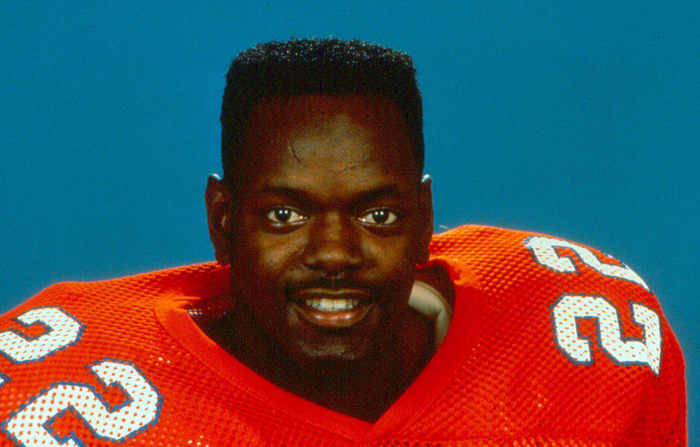
Smith may be better known for his NFL career, but his time in college was pretty impressive. He had a huge freshman campaign (at the time, the quickest a running back got to 1,000 yards rushing to begin a career) and continued to eat up yards before forgoing his senior season for the NFL. In his three-year career, he ran for 3,928 yards and 36 touchdowns for some mediocre Gator teams.
Darren Sproles, Kansas State

Sproles was electric. He rushed for 4,979 yards and 45 touchdowns, caught 66 passes for 609 yards and two touchdowns and had 1,224 return yards and another touchdown. In the 2003 Big 12 championship game against Oklahoma, he ran for 235 yards and added 88 yards receiving and a touchdown to win the conference championship — the Wildcats' first in nearly 70 years.
Thurman Thomas, Oklahoma State

Thomas is known as the player who was standing in Barry Sanders' way at Oklahoma State, but you must be pretty good if you are keeping him at bay. Thomas ran for 4,847 yards and 43 touchdowns in his Cowboys career, winning the Big Eight's Offensive Player of the Year twice. If Thomas hadn't torn his ACL after his sophomore season, which limited him during his junior year, his statistics could be among the best his history.
Anthony Thompson, Indiana
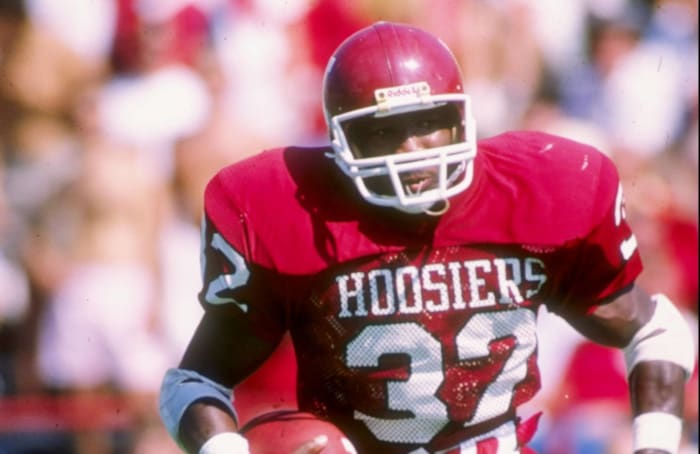
Thompson rushed for 5,299 yards, winning the Big Ten MVP award twice and was twice a consensus All-American. He won the Maxwell Award and Walter Camp Award his senior season. When he graduated, he set the career rushing touchdown record (his 67 TDs are now seventh all time). The Hoosiers went to three straight bowl games with Thompson (only time that has ever happened), and his junior year was the last time Indiana ended the season ranked.
Jim Thorpe, Carlisle

Thorpe simply was an outstanding athlete in everything he did. At Carlisle, he played running back as well as placekicker, punter and defensive back. He was an All-American in both 1911 and 1912, and though statistics are tough to come by from back then, researchers believe Thorpe ran for nearly 1,900 yards during Carlisle's 1912 national championship season.
LaDainian Tomlinson, TCU

In his first two seasons at TCU, Tomlinson actually was in a platoon with Basil Mitchell. Despite having to share touches, Tomlinson is 12th all time in rushing with 5,387 yards and finished with 56 rushing touchdowns. In 1999, he set the single-game record for rushing yards (since broken). He won a Doak Walker award and was a unanimous first team All-American his senior season.
Doak Walker, SMU

When the award for the season's best running back is named after you, you better believe you'll make this list. Walker's college career was interrupted by his military service, but when he was on the field he was everywhere. A back, kicker, kick returner and defensive back, Walker scored touchdowns as a runner, receiver, returner and passer. He won the 1947 Maxwell Award and the 1948 Heisman Trophy.
Herschel Walker, Georgia

There are a lot of experts who consider Walker the greatest college player ever, regardless of position. He was a three time All-American and finished in the top three in Heisman voting in all three of his collegiate seasons. In those three seasons, he also was the SEC Player of the Year. He set the freshman rushing record en route to leading Georgia to a national championship and won the Heisman Trophy his junior season. He is 15th all-time in rushing despite playing only three years of college.
Charles White, USC

White is fifth all time in rushing yards in NCAA history. He ran for 1,478 yards as a sophomore, 1,859 yards as a junior (when USC won the national championship) and 2,050 yards in his Heisman-winning senior season. He also was superb pass-catcher for a back at that time and scored 53 total touchdowns.
DeAngelo Williams, Memphis

Williams ran for 100 yards in a game a record 34 games, owns the NCAA record for career all-purpose yards and is sixth all time in rushing yards. He rushed for at least 1,900 yards in both his junior and senior seasons. He caught or ran for 60 touchdowns and won the Conference USA's Offensive Player of the Year Award three times.
Ricky Williams, Texas

Williams is fourth all time in rushing yards and fourth all time in rushing touchdowns. When he left Texas, he was the career rushing leader and career rushing touchdowns leader. (Both records were broken one year later.) He ran for at least 200 yards in 12 games, a record he shares with Marcus Allen and Ron Dayne. Williams also won the 1998 Heisman Trophy.
Garrett Wolfe, Northern Illinois

Wolfe redshirted and then sat out another season due to academic reasons. In the three years he did play, he was thrilling. The diminutive Wolfe (5-foot-7) ran for 5,164 yards (he averaged 156 yards per game) and 52 touchdowns. He wasn't just a back who feasted on the Mid-American Conference: In 2006 he ran for 171 yards and added 114 yards receiving against No. 1 Ohio State.
Shiloh Carder has over 20 years experience in covering sports for various websites and has been with Yardbarker since 2009. A Charlotte, NC native who now lives outside Cincinnati, he has covered college basketball, college football, NFL and NBA. You can find him on Twitter/X at @SportzAssassin
More must-reads:
- Five standouts from the final day of practice at 2026 Senior Bowl
- Washington lands 4-star WR Zerek Sidney over Oklahoma and Arizona State
- The 'Most TD in first two NFL seasons' quiz
Breaking News
Trending News
Customize Your Newsletter
 +
+
Get the latest news and rumors, customized to your favorite sports and teams. Emailed daily. Always free!
PRIVACY POLICY EDITORIAL POLICY CONTACT US
ABOUT YARDBARKER TERMS OF SERVICE
Use of this website (including any and all parts and
components) constitutes your acceptance of these
Terms of Service and Privacy Policy.
This site is for entertainment purposes only.
There is no gambling offered on this site.
Gambling Problem? Call 1-800-Gambler.
